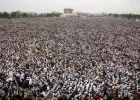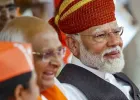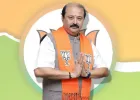- Opinion
- Why Gujarat Lacks Young Muslim Leadership?
Why Gujarat Lacks Young Muslim Leadership?

The absence of young Muslim leadership in Gujarat’s politics is a real and complex issue rooted in social, political, and historical contexts. While major parties like the Bharatiya Janata Party (BJP), Congress, and Aam Aadmi Party (AAP) dominate the state's political scene, meaningful representation of young Muslim leaders remains scarce.
One of the key reasons is political polarization. The 2002 Godhra incident and the communal violence that followed significantly deepened the divide between Hindu and Muslim communities in the state.

Since then, many political parties have been reluctant to field Muslim candidates, fearing a backlash or loss of votes due to polarization. This has especially hindered the rise of new and young Muslim faces, as parties tend to favor experienced and recognizable figures.
Secondly, there is a relative lack of educational and economic empowerment within the Muslim community, particularly among youth. Compared to other communities, Muslim youth often lack the confidence, resources, and networks necessary to rise through political ranks. Even when political awareness exists, the absence of social and financial support limits their ability to make an impact.
Another factor is the internal structure of political parties. Leadership opportunities are often controlled by dominant caste groups and well-established figures within parties. Muslim youth are rarely given chances to ascend to influential positions. For example, in the 2022 Gujarat Assembly elections, major parties gave very few tickets to Muslim candidates, and almost none to emerging young leaders from the community.
Moreover, conservative mindsets and fear of political backlash or violence discourage many young Muslims from entering the political arena. Concerns about communal tensions, social boycotts, and safety often outweigh the motivation to participate in active politics.

However, the rise of education and social media is slowly sparking political awareness and engagement among young Muslims. This change has the potential to reduce the leadership gap in the future.
To address this issue, political parties must actively encourage and nurture Muslim youth leadership. This includes creating more educational and leadership opportunities, ensuring equal representation, and fostering a social environment of trust and inclusivity. Only then can Gujarat’s political space become truly representative of all its communities.
About The Author

Lorem Ipsum is simply dummy text of the printing and typesetting industry. Lorem Ipsum has been the industry's standard dummy text ever since the 1500s, when an unknown printer took a galley of type and scrambled it to make a type specimen book. It has survived not only five centuries, but also the leap into electronic typesetting, remaining essentially unchanged. It was popularised in the 1960s with the release of Letraset sheets containing Lorem Ipsum passages, and more recently with desktop publishing software like Aldus PageMaker including versions of Lorem Ipsum.






















